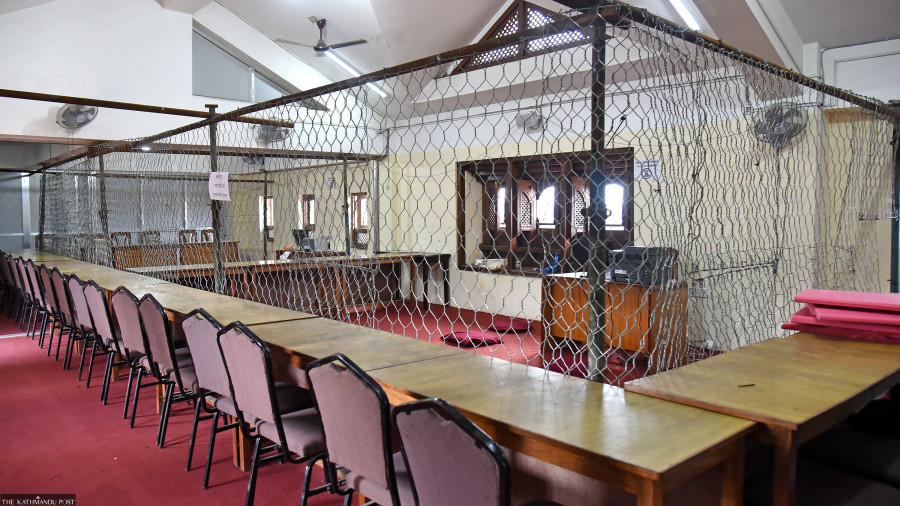Politics
Counting votes within wire fences reflects degrading political culture
Fears of shenanigans have grown, prompting measures like CCTV and fencing.
Binod Ghimire
That voting for local elections is over, all eyes are now on counting. From wire fencing to CCTV cameras, authorities have tried to make the counting centres as secure as possible, prompted, apparently, by the Bharatpur counting fiasco in 2017.
In its directives for the safety of the counting centres, the Election Commission had directed the local units to install CCTV cameras to ensure fair vote counting.
At some counting centres, including in Kathmandu, metal fences have been set up to keep party representatives away from the main counting area.
Vote counting is done by officials deployed by the Election Commission in the presence of authorised representatives of the parties contesting the elections.
There are more than one representative from each party. The fencing will bar access of the party representatives, other than those authorised to sit for the counting, to the ballot papers.
“We have information that there are wired fences at almost all counting centres to ensure security during the vote count though there is no such directive from the commission,” Tulasi Shrestha, a joint secretary at the commission, told the Post. “The returning officers and security agencies could have decided to put up fences.”
Not just in the rural and remote areas, the wire fences have been set up even at the Capital’s Rastriya Sabha Griha, where the counting of the votes of Kathmandu Metropolitan City, will be done.
Raju Khatiwada, chief returning officer in Kathmandu, said they have arranged the fences so as to ensure that counting can be done without disturbance.
“It is always better to take precautions while dealing with sensitive issues,” he told the Post.
In Nepal, elections are like festivals and people enthusiastically participate in voting. Some parties, however, when they sense they are losing, turn violent and resort to snatching away the ballot boxes and tearing up ballot papers, past experiences show.
Experts say the trend of putting up fences started after some incidents of tearing up of the ballot papers in the first phase of local elections in May 2017. CPN (Maoist Centre) cadres from Bharatpur Metropolitan City, Chitwan, tore apart at least 90 ballot papers on June 1, 2017 when the party’s mayoral candidate Renu Dahal was trailing behind her competitor Devi Gyawali from the CPN-UML.
Dahal won in the re-polling.
The first phase of local elections was held on May 14, 2017 in Bagmati, Gandaki and Karnali Provinces which includes Chitwan. Province 1, Lumbini and Sudurpaschim Provinces voted in the second phase on June 28 and Madhes Province in the third phase on September 18.
Narendra Dahal, a former election commissioner, said the fences were erected in some local units during the counting after the second and the third phases of local elections.
“The fences are for the protection against possible disruption in counting from the representatives of the political parties,” Dahal told the Post. “This is an unfortunate situation. It indicates eroding political culture among the parties.”
Observers say indiscipline among the parties and their cadres has resulted in acts like fencing off of the counting centres. They say the party cadres don’t dare tear up and chew the ballot papers or disrupt the counting until they get directives and backing from their leaders.
The mindset among the political class that the elections must be won by hook or by crook leads to the acts like destroying the ballot papers, according to observers
Kapil Shrestha, chairperson of the National Election Observation Committee who also is a professor of Political Science at the Tribhuvan University, said putting fences at the counting centres is not a civilised practice.
“This is a matter of shame for our political system and our society as a whole,” he told the Post. “Fencing, generally, is done for protection from animals. But we are putting them to protect our ballot papers from humans.”
He says the parties and leaders who respect the people never destroy ballot papers, which is a huge disrespect to the sovereign people.
Shrestha said lack of stern actions from the authorities against those who disrupt the vote counting too is responsible for the present situation.
“No one would dare to destroy the ballot papers if those who committed such acts in the past were punished,” he said. “Sadly our state agencies fear the parties.”




 22.6°C Kathmandu
22.6°C Kathmandu













